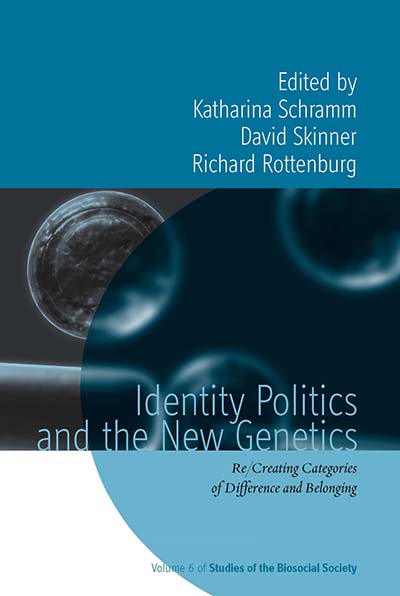Identity Politics and the New Genetics: Re/Creating Categories of Difference and Belonging [Kate Reed Review]Posted in Book/Video Reviews, Media Archive, Social Science on 2013-03-07 00:38Z by Steven |
Ethnic and Racial Studies
Volume 36, Issue 3, 2013
Special Issue: Racialization and Religion: Race, culture and difference in the study of Antisemitism and Islamophobia
pages 517-518
DOI: 10.1080/01419870.2012.734393
Kate Reed, Senior Lecturer in Medical Sociology
University of Sheffield
Katharina Schramm, David Skinner and Richard Rottenburg (eds.) Identity Politics and the New Genetics: Re/Creating Categories of Difference and Belonging, Oxford: Berghahn Books, 2012 (Volume 6 of Studies of the Biosocial Society), vi +221 pp. (hardback).
This is an interesting edited collection on race, ethnicity, identity and genetics. Focusing on exploring the intersections between genetic research and technology and the social and political construction of identities, the book offers a timely and original contribution to debates in the field. It explores the often uneasy relationship between new genetics and the politics of race, ethnicity and nation, highlighting the co-production of science and politics in the process. The text covers a range of issues related to race, ethnicity, identity and genetics at global, national, and local levels. It aims to unpack the concept of identity, further exploring the ways in which genetics affects local/global discussions of ethnicity and race. Overall, the book successfully highlights the complex and often contradictory nature of the relationship between politics and science.
After the editors’ introduction outlines the main themes and concerns of the collection, the volume begins with a contribution by Andrew Smart, Richard Tatton, Paul Martin and George Ellison. Their chapter offers a conceptual engagement with debates about social constructivism. They stress the importance of fluidity and flexibility in identity politics surrounding race and genetics on the one hand, without losing the focus on racialzation and racism as both historical and contemporary processes on the other. In chapter 2, David Skinner stays with the issue of race, categorization and genetics, this time focusing on the British criminal justice system. Skinner situates the emerging biopolitics of race, genetics and identity within the context of a varied and changing use of official systems of racial and ethnic categorization. Peter Wade’s chapter is also concerned with the changing dynamics of racial classification, particularly regarding the notion of “race-kinship congruity”. Drawing…
Read or purchase the review here.
